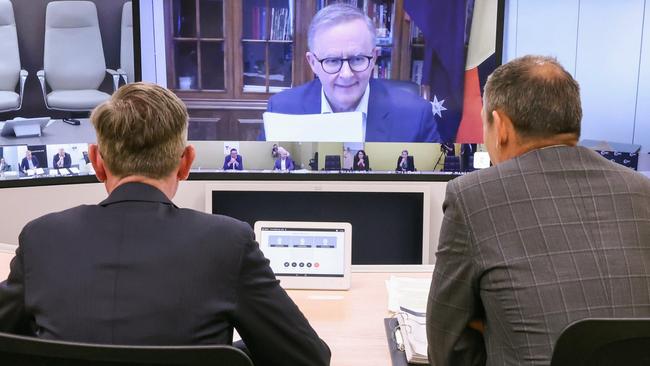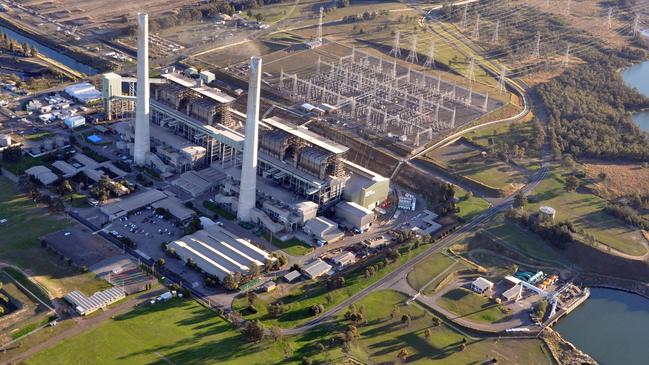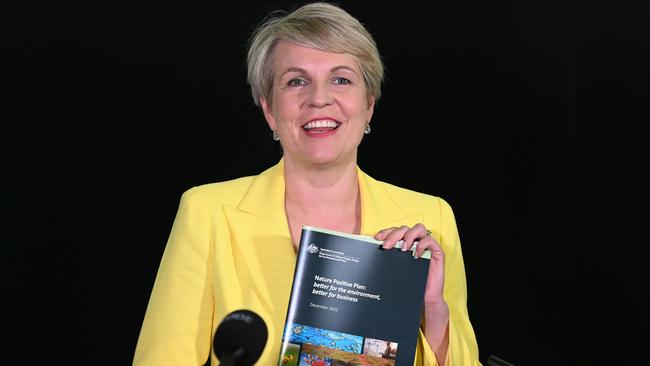Peta Credlin: Leaders ignoring the reality of our energy problem
Coal-fired power is being withdrawn from the system by woke public companies and gas developments have become almost impossible which means prices will keep on rising.
Opinion
Don't miss out on the headlines from Opinion. Followed categories will be added to My News.
While Anthony Albanese peddled the fantasy that Labor policy could cut household power bills by $275 a year, the reality – confirmed by the ACCC on Friday – is that “the median annual bill for residential customers” has increased by $294 (or 23 per cent) since April.
On Friday, a panicked national cabinet promised as-yet-unspecified rebates for consumers, plus price caps on coal and gas. But this is robbing Peter to pay Paul, won’t make much short-term difference to power bills, and is a massive breach in the hitherto accepted principle that governments can’t dictate to businesses the prices they charge.
The Albanese government claims that households will be $230 better off, but the modelling behind the spin says that prices will still rise by 23 per cent over the next financial year, despite the deal, rather than 36 per cent otherwise.
And I am sure it’s not lost on you that the same consumers set to receive these promised energy rebates are in fact the same taxpayers paying for them!

We are in this energy mess because too many people in authority assume that because solar panels and batteries can run a house, renewables can run a whole economy too.
As a result, coal-fired power is being withdrawn from the system by woke public companies. And new gas developments have become almost impossible thanks to activist lawfare. So, prices will continue to skyrocket and widespread blackouts, or forced rationing for heavy industry, are almost inevitable because the only new power coming into the system doesn’t work when the sun won’t shine and the wind won’t blow.
This is the unavoidable result of a power system that’s been run for years to reduce emissions rather than to produce affordable and reliable electricity.
Energy Minister Chris Bowen’s latest green catchcry “dispatchable renewable power” is an oxymoron; a contradiction in terms.
By its very nature, wind and solar power can’t always be available – unless, of course, they’re coupled with something else like batteries, that can’t produce grid-scale power for more than a few minutes; pumped-hydro which is expensive, environmentally fraught and still years away at grid scale; green hydrogen which remains completely unproven; or gas, which has so far sustained the move to renewables, but which is going to be more and more expensive as demand explodes but supply is constricted by yet more eco-extremism.
That’s the reality that Friday’s national cabinet meeting simply refused to face. Instead, it put a Band-Aid on a bullet wound, with its price caps on coal and gas and rebates for consumers.
Capping fossil fuel prices guarantees that there will be less investment and, over time, shortages of coal and gas, even though fossil fuels will for decades continue to be needed to keep the lights on.
And, I repeat again, government-funded rebates on power bills means taxpayers funding consumers. In other words, us funding us.
Once the principle of price control is conceded for gas and coal, what about price control for other “necessities” such as rent and food? This is a massive departure from economic normality and a slippery slope towards a command economy apparently connived at by both sides of politics through the national cabinet.

No one who matters seems to be listening to the few sane voices still in our energy debate.
David Fallu, head of Tomago Aluminium, NSW’s biggest energy consumer, pointed out last week that his business would still need gas to “fill the breach when renewables aren’t generating”.
Trevor St Baker, a big investor both in renewable and in coal-fired power generation, said that the Liddell Power Station, that produces 10 per cent of NSW’s power, would have to be kept operating beyond April next year to ensure that the lights stayed on (yet there are plans to, literally, blow it up with dynamite). Even the Business Council of Australia said that “price caps will send the wrong signal to investors … when we need to be getting new supply into the market”.
And while both shadow treasurer Angus Taylor and Opposition Leader Peter Dutton have made the obvious point that this is policy on the run, the Opposition hasn’t said what, precisely, it would do differently, such as refusing to allow the exit of coal until there’s a reliable dispatchable alternative, presumably because Liberals like NSW Treasurer Matt Kean share Labor’s coal-phobia and emissions obsession.
No one should fall for Labor’s spin that Putin’s war is to blame for higher power bills. The war started in February and in the months that followed until they won the election in May, Labor promised they would cut power bills. It is only after they won, that this promise was dropped and the war emerged as their excuse.
Rather than Putin, the real problem is the massive and accelerating shift from power from fossil fuels that’s available 24/7, to power from the wind and the sun that depends entirely on the weather and that therefore has to be “firmed” with gas. An honest conversation with the Australian public is long overdue about how we can have reliable and affordable power OR much lower emissions but not both, at least in the absence of nuclear.
WE NEED LESS GREEN TAPE AND MORE ACCOUNTABILITY
I suppose we were warned. On page 42, Labor’s election platform states that the federal government should have the “institutional capacity to provide effective and transparent environmental management systems” including “an Environment Protection Agency” that was described as a “strong cop on the beat that is genuinely independent of the government”. But with the Prime Minister-to-be wanting to present himself as “safe change”, this wasn’t exactly highlighted by Labor, the media, or a Coalition that wanted to say that it was just as committed to environmental action.
But with the election safely won, the Albanese government is getting on with remaking the country along leftist lines, with radical changes such as letting the unions stampede small business and giving indigenous activists a near-veto over what governments can do.
This new EPA, that Environment Minister Tanya Plibersek confirmed on Friday is coming, will map the whole country into “green” areas that can readily be developed, “orange” areas where environmental caution will be required, and “red” zones that are “precious and irreplaceable” and therefore no-go zones for development.

As well, there will be new green taxes via legally enforceable requirements to “avoid and mitigate” environmental harm, possibly through “like for like offsets” or alternatively through “conservation payments” made to an “independent government trust” for “reinvesting” in environmental restoration.
As always, the assumption is that Australia is an environmental basket case even though the reality is that measures such as water quality and air quality have never been better. As well, there has never been more effort to protect endangered species and habitats. But with so much green tape already, and with the states and the Commonwealth already tripping over each other to enforce maximal environmental standards, what evidence is there that this body won’t just be a needless handbrake on development that already has to jump through too many green hoops, as anyone who needs an environmental approval knows too well.
Not to mention yet another costly and unaccountable bureaucracy. That’s my biggest issue here. It’s yet another entity that’s not accountable to voters. If we need more rules, let them be set and administered by ministers who are accountable to us and by officials who are accountable to ministers. Not by an activist agency that is effectively a law unto itself.
WATCH PETA ON CREDLIN ON SKY NEWS, WEEKNIGHTS AT 6PM
More Coverage
Originally published as Peta Credlin: Leaders ignoring the reality of our energy problem





